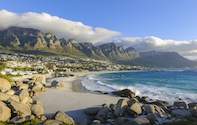
South Africa is an efficient, 'second world' society. Its cities are large, developed and cosmopolitan. Its attractions are diverse and spectacular. Is it any wonder, therefore, that the country is Africa's most popular tourist destination?
A striking aspect of Johannesburg, at least to the uninitiated, is the flat-topped yellow hills that dot its outskirts. These mine dumps are glowing reminders of the fact that southern Africa's wealthiest, most populous and fastest-growing city stands over the richest seams of gold ever discovered.
Johannesburg was founded as recently as 1888, and little effort was made to beautify the place even then - few people thought the mining shanty town would last more than 20 years. Sadly, this formative aesthetic has survived into the modern era. Johannesburg has many assets - it is a vibrantly cosmopolitan city, with a near-perfect climate - but attractive it is not.
Most tourists spend little time in South Africa's heaving commercial centre. The better-advised ones head straight up the 60km of highway that leads north to the official capital of Pretoria: staid, sleepy, and best known to Westerners for the Union Buildings outside which President Mandela was inaugurated in 1994.
Could any two cities be more different in character than Johannesburg and Cape Town? Many long-time globetrotters rank Cape Town with Rio and Sydney as perhaps the most visually arresting in the world. It is also South Africa's oldest city. It nestles between the Atlantic coast and the incomparable Table Mountain on a bay settled by the Dutch in 1652.
The beaches and mountains of the adjoining Cape Peninsula are a delight, but what makes Cape Town special is not simply the scenery. The stately Cape Dutch architecture generates a strong sense of place, and the city's almost infinitely laid-back atmosphere is perhaps its one truly African feature. In many parts of Cape Town you could be forgiven for wondering whether you are in Africa at all.
Cape Town is renowned for its varied selection of restaurants. Seafood is a speciality, as is traditional Cape Malay cooking, but there's something for everybody. Good food is something you can take for granted here; it is possible to eat top-class international standard cuisine at prices that will seem absurdly cheap to most western visitors.
And if you count yourself among those for whom wining and dining is an integral part of any holiday, then South Africa's prolific vineyards won't let you down. Not only is the wine damn good, but it is damn good value for money.
South Africa's main centre of viniculture lies only an hour from Cape Town by road, and even confirmed lager louts will enjoy a wine-tour through the historic town of Stellenbosch, whose leafy avenues boast perhaps the country's greatest concentration of Cape Dutch architecture. Also to be enjoyed is the superlative mountain scenery that characterises the Cape Winelands.
Different again is the seaport of Durban, the busiest harbour on Africa's Indian Ocean coast. Somewhat paradoxically, this is also an important resort town, boasting a busy seafront beach complete with aquarium, funfair and a string of bars.
What may come as a surpise to visitors is Durban's decidely Asian tang - this is where South Africa's large Indian community is centred, and a visit to the exotically aromatic Indian market is a must, as is a meal in any of several excellent Indian restaurants.

